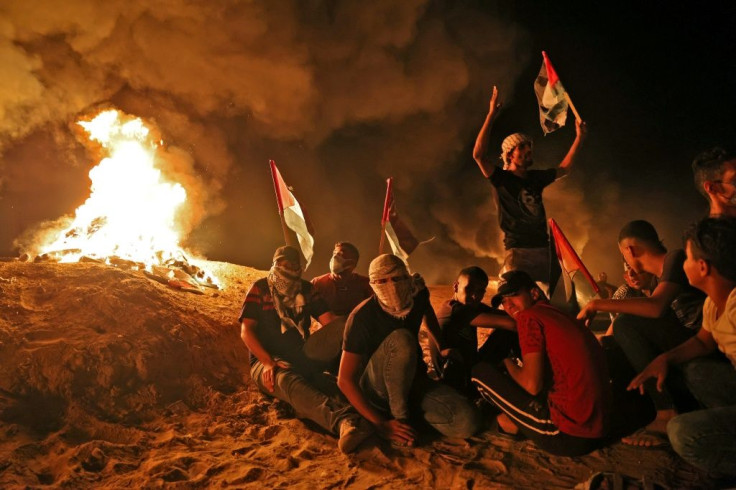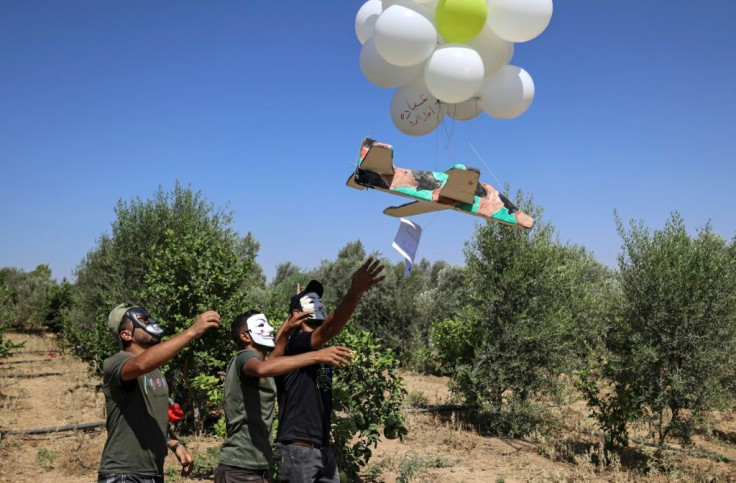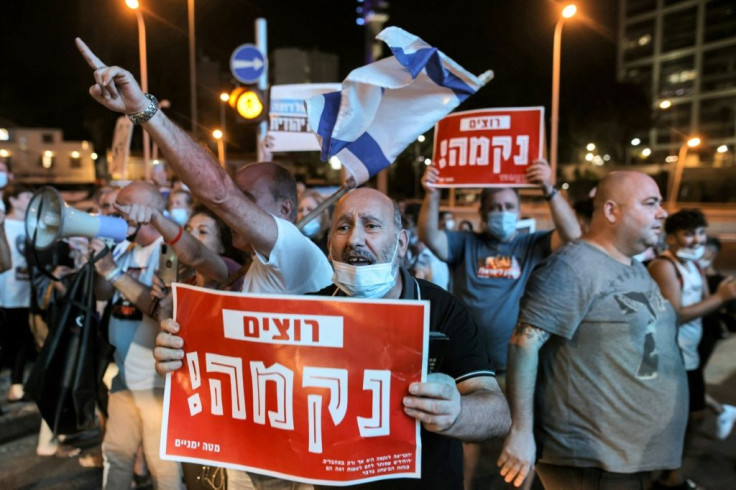Gaza Rulers Hamas Wage Perilous Campaign Of Harassing Israel
As night falls on the Gaza Strip, Palestinian protesters approach the border fence with Israel, carrying homemade stun grenades and Molotov cocktails to hurl toward the enemy soldiers.
The aim of these so-called disruption operations, sponsored by the Islamist armed group Hamas that rules Gaza, is to harass the Israeli border forces -- but analysts warn it is a dangerous game.
One of the protesters, 19-year-old Farid, said he studies engineering at Gaza University by day, and then joins the night-time rallies demanding an end to the 15-year-old Israeli blockade.
The young man had brought a homemade stun grenade, which he hurled toward the border fence, heavily guarded by the Israeli army, about 200 metres (219 yards) away.
A flash of light burst through the darkness, followed by a blast that, for a brief moment, drowned out the martial music playing from a huge portable sound system.

"We'll drive them crazy," Farid said enthusiastically.
"As long as we can't sleep in safety, we won't allow the soldiers, the occupation, to sleep!"
Street vendors nearby sold cold drinks, and buses waited to take the protesters back to Gaza City at the end of the evening.
All this could have created an almost festival-like atmosphere -- were it not for the regular casualties that result from these protests.
Three Palestinians -- including a member of the armed wing of Hamas -- and an Israeli sniper have lost their lives since mid-August in these demonstrations.

The Israeli army at times fires live rounds. It also manoeuvres drones overhead which from time to time drop tear gas grenades, forcing the crowds to scatter.
The recent deaths are a reminder of the fragility of the truce between Israel and Hamas, which fought their last full-scale war in May, the fourth since 2008.
In that bloody escalation, Israeli strikes on Gaza killed 260 Palestinians, including fighters, between May 10 to 21, according to local authorities.
In Israel, rocket fire from the Palestinian territory killed 13 people, including a soldier, according to the police and army.

Since the Egypt-brokered ceasefire, Hamas has fired only one rocket, instead re-focussing on its disruption operations.
These include activists sending incendiary balloons floating through the sky and into Israel, where they start fires in grasslands and on farms.
The Israeli air force often responds with strikes, most recently targeting Hamas infrastructure on Monday night.
The Hamas strategy is one of "limited and carefully calculated" escalation, said Mukhaimer Abu Saada, a political science professor at Al-Azhar University in Gaza.
The aim is to protest Israeli restrictions on the impoverished enclave of two million people, but without spiralling into another full-scale conflict.
Since the last war, Israel has eased restrictions on the entry of goods into Gaza, widened the permitted fishing zone and approved a new system for distributing Qatari aid via the UN, which Doha has said would begin soon.
Hamas, which dismisses these steps as nowhere near enough, has resumed its campaign to "irritate" Israel while avoiding "an open armed confrontation", said Mukhaimer Abu Saada, who labelled it a risky strategy.
"Hamas prefers to use disruption units along the fence because the Israeli deterrence towards Hamas works in a way," said researcher Kobi Michael, a former Israeli strategic affairs ministry official in charge of Palestinian issues.
"They understand that if they launch rockets, the probability that the Israeli retaliation will be much more rapid and aggressive is higher."
For more than a year from March 2018, every Friday demonstrators would amass along the fence, demanding an end to the blockade and the "right of return" for Palestinians driven into exile when Israel was created in 1948.
About 310 Palestinians were killed by Israeli soldiers' fire, and eight Israelis also died during that period.
Hamas -- emboldened by what it has presented as a "victory" after the latest war in May -- now "feel they are able to provoke Israel... but they might be wrong," said Michael.
Hamas thinks they can "control the level of violence", he said, adding that this might be "a miscalculation because Israel is losing its patience.
"Israel will have no problem retaliating very aggressively if Hamas drags it into another campaign."
© Copyright AFP 2024. All rights reserved.





















